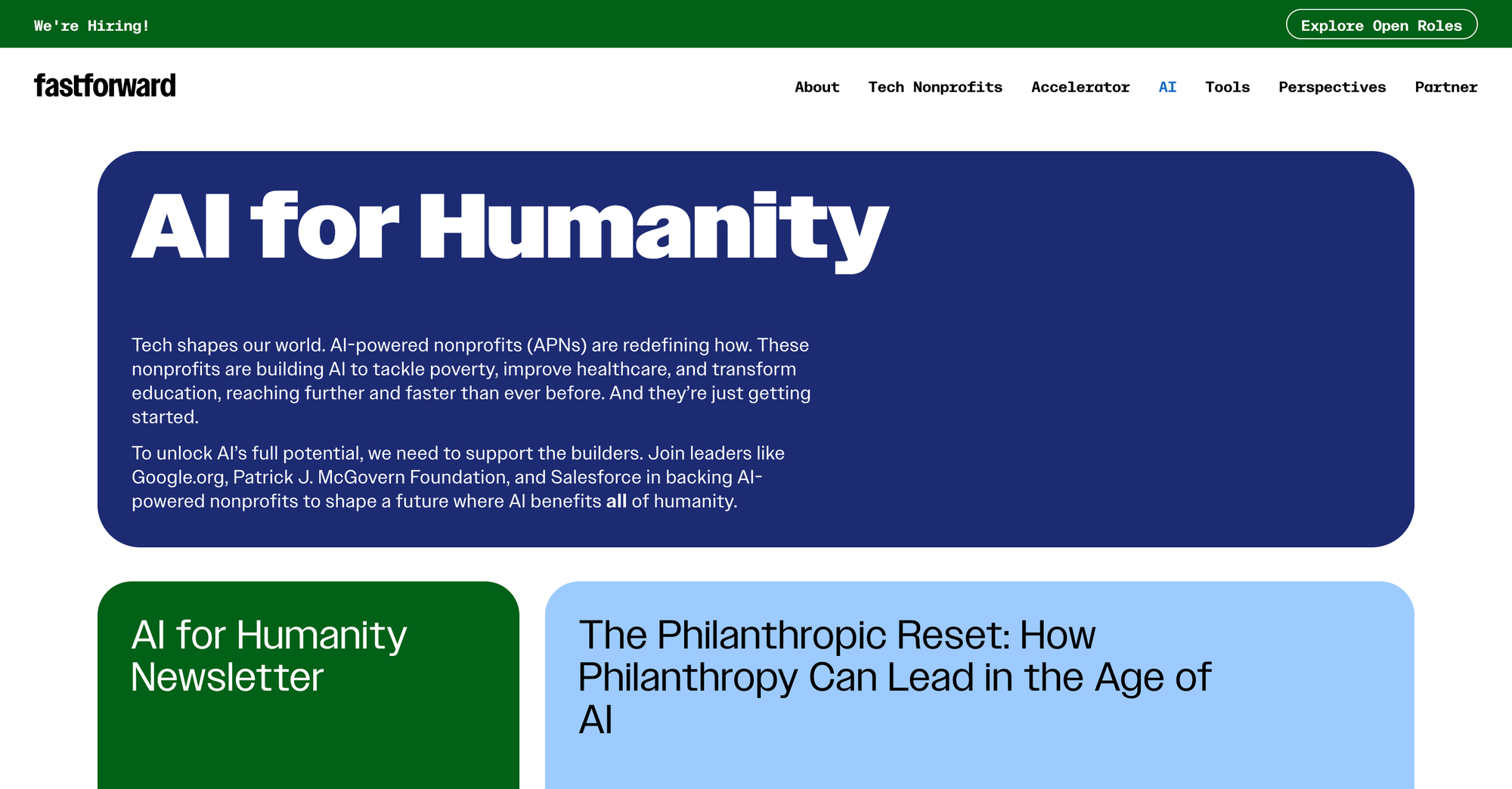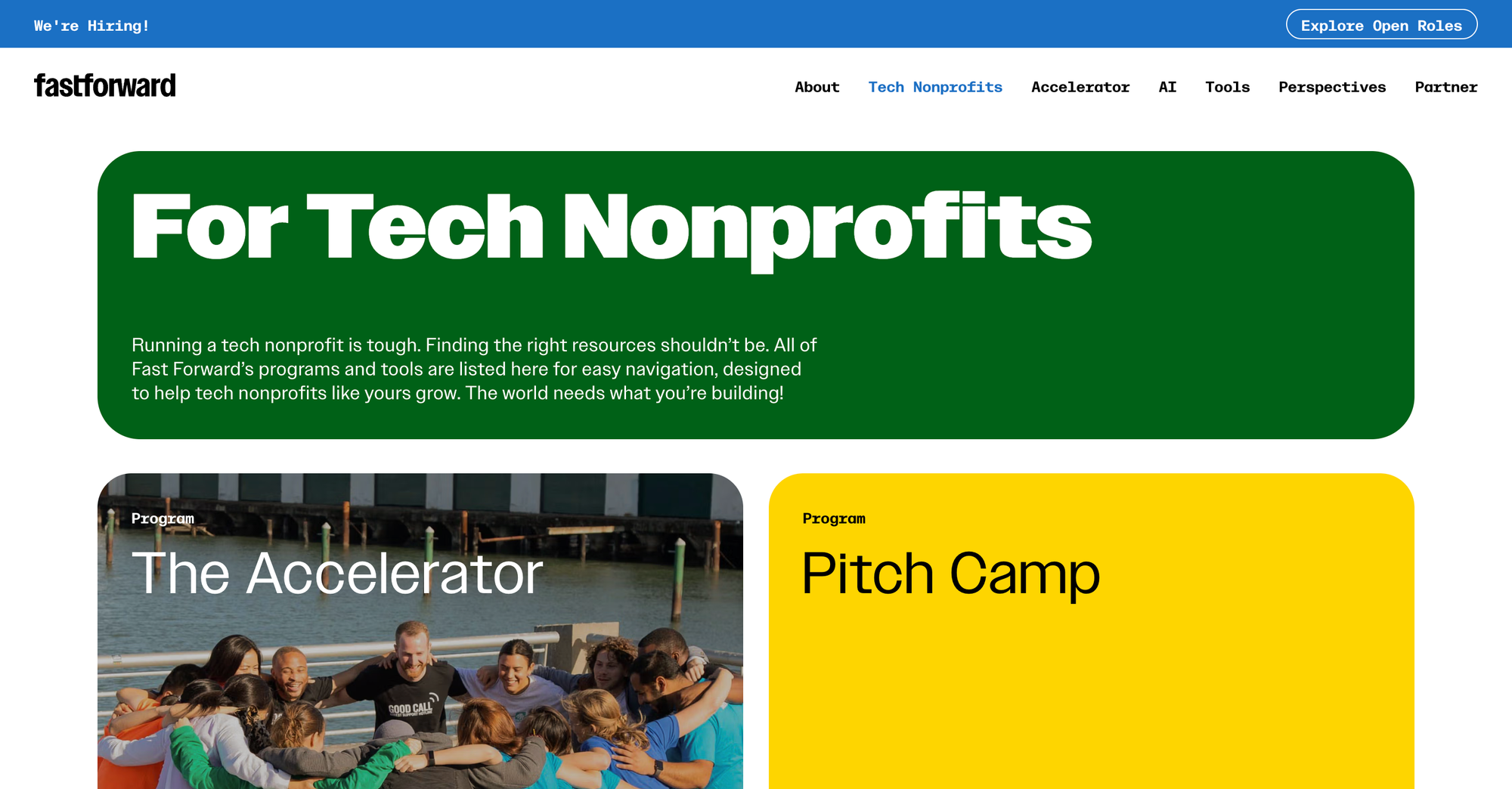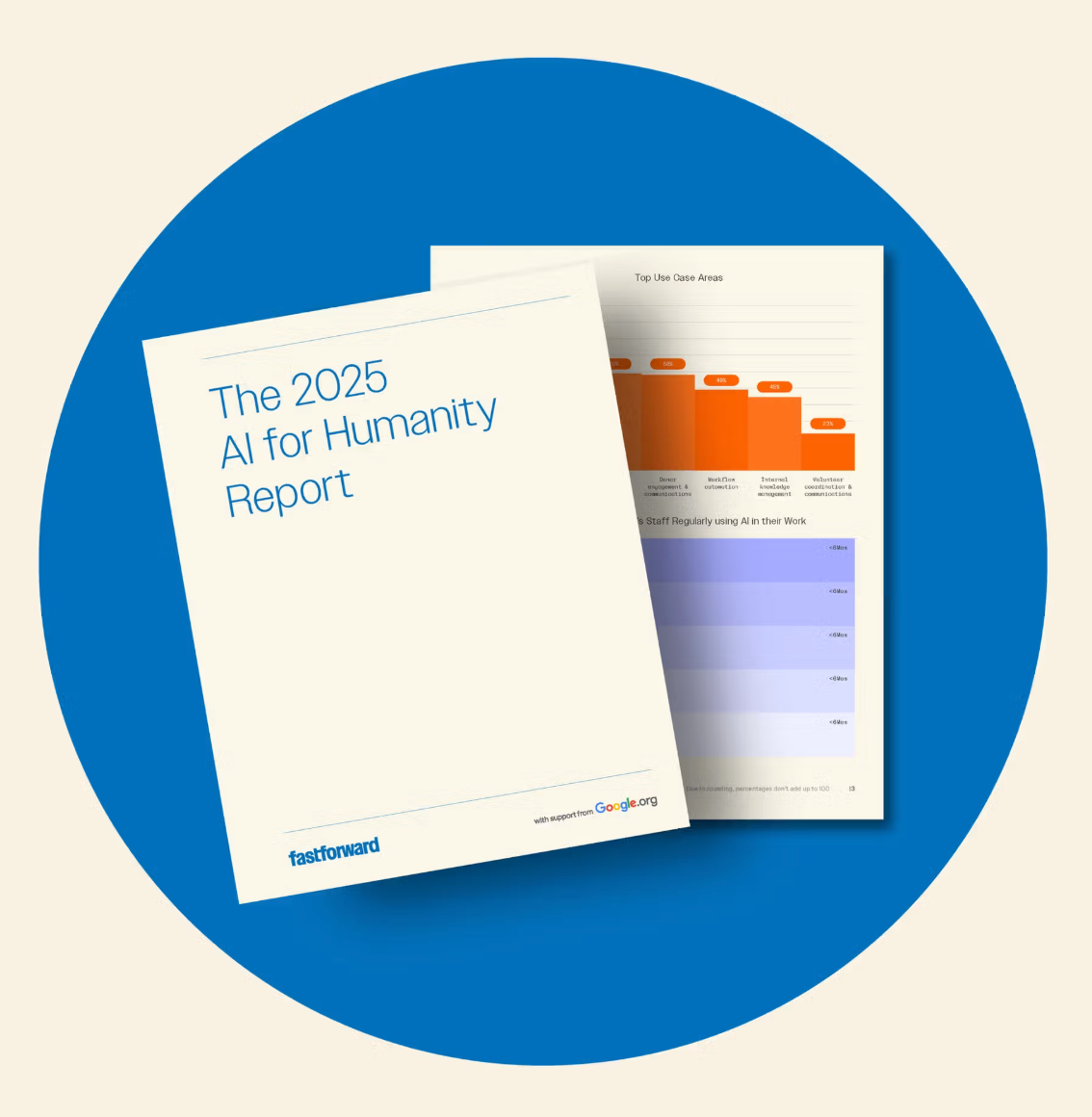On this episode of Disruptors for GOOD, I sits down with Kevin Barenblat, Co-founder of Fast Forward, to unpack how the nonprofit accelerator is helping mission driven teams use technology, and now AI, to scale impact.
From the early days of tech nonprofits to a new wave of AI powered organizations, Kevin shares what he is seeing on the ground, what the 2025 AI for Humanity Report reveals, and how philanthropy can help the sector move faster and more responsibly.
Fast Forward launched the first accelerator dedicated to tech nonprofits and has now supported more than 100 organizations.
Alumni have reached hundreds of millions of people and unlocked over one billion dollars in cumulative follow on funding, a signal that this model works at scale.
What Fast Forward Does
Fast Forward runs a three month accelerator that blends virtual learning with in person kickoff and demo day in San Francisco.
The program focuses on the same fundamentals any great startup needs, clear problem definition, product, distribution, fundraising, team, and storytelling.
Once founders graduate, Fast Forward continues to support them as part of a long term portfolio community.

Why AI Matters for Nonprofits right now
Fast Forward’s new AI for Humanity Report is a deep dive into how nonprofits are already using AI to deliver program impact and to run leaner operations.
The report distinguishes between AI assisted nonprofits that use AI internally for tasks like grant writing or analysis, and AI powered nonprofits that put AI at the center of their beneficiary facing products.
A related Fast Forward playbook highlights real adoption hurdles. Nearly half of surveyed organizations cite data privacy as a top concern, and over four in ten point to limited in house expertise.
The throughline is clear, nonprofits need capacity building, targeted funding, and practical education to implement AI responsibly.

Examples from the Accelerator
- Visilant makes eye screening accessible with a smartphone and AI, allowing community health workers to spot causes of blindness for a fraction of traditional equipment costs. The approach decentralizes care and connects patients to surgeons when needed.
- Climate TRACE, a coalition co organized by WattTime, uses satellites and AI to track greenhouse gas emissions and make the data open to the world. It shows how AI can process signals that humans cannot, enabling better climate action.
Philanthropy’s Role
Fast Forward is convening funders to align on responsible adoption and to resource the tech and talent nonprofits need.
Sessions with leaders across journalism, philanthropy, and tech focus on practical steps to future proof the ecosystem so that AI advances equity rather than deepens divides.

Key takeaways
- Tech nonprofits are no longer the exception. The pipeline now includes many AI powered teams building on modern stacks to solve market failures, not just market opportunities.
- Adoption is real, and so are the hurdles. Privacy, security, and talent are the biggest blockers that funders and capacity builders can help address.
- Impact scales when infrastructure scales. Fast Forward’s portfolio has surpassed one billion dollars in follow on funding and has reached over 262 million people, proof that this model compounds.
Q&A Transcript Highlights
Grant: Thank you so much, Kevin, for joining me today. Super excited to talk to you. I have really admired Fast Forward for a long time. Tech for nonprofits is not new, but with the advent of AI we are starting to see real progress as tech penetrates the nonprofit world unlike ever before.
Kevin Barenblat: Thanks, Grant.
Grant: Before we get into the AI report that you and the team just released, talk a little bit about Fast Forward and its overall mission and vision.
Kevin Barenblat: Fast Forward started 12 years ago. Shannon Farley and I brought our two worlds together, my background in tech and Shannon’s in nonprofit, to create what is essentially a Y Combinator for nonprofits, a tech accelerator geared toward early stage organizations that look like tech startups but are set up as nonprofits. Over a hundred nonprofits have gone through our accelerator and they are impacting hundreds of millions of lives by leveraging technology across health, education, climate, and economic mobility to scale impact.
Grant: Share a bit about your background and how it pulled you into building for the nonprofit world.
Kevin Barenblat: My career is mostly in tech and startups. After my company was acquired, I explored what to build next and kept noticing there were thousands of accelerators for for profit startups and none for nonprofit startups. At the same time, Sal Khan was educating millions with Khan Academy and still struggling to raise money. It felt obvious that we needed an accelerator for organizations like that. That is how Fast Forward began.
Grant: When did Fast Forward start leaning into AI for nonprofits and how did that maturation happen inside the organization?
Kevin Barenblat: We began supporting what we now call AI powered nonprofits back in 2015. As AI matured, we formalized support with our AI for Community program two years ago. Today about half of our alumni identify as AI powered and most new applicants do as well. Adoption has been incredible.
Grant: Give us one or two examples of AI powered nonprofits in your orbit.
Kevin Barenblat: Visilant uses smartphone based imaging and AI to help non trained workers screen for causes of blindness at very low cost. On climate, WattTime helped form Climate TRACE, which uses satellites and AI to track emissions in near real time and publish the data openly.
Grant: What did the AI for Humanity Report set out to learn and what stood out?
Kevin Barenblat: We surveyed a few hundred organizations to understand how they use AI. We defined AI assisted nonprofits that use AI internally, and AI powered nonprofits that deliver their impact with AI. Both matter. Internal use drives efficiency. AI powered products create entirely new classes of impact at scale.
Grant: Are founders mostly using tools like Anthropic or ChatGPT for operational efficiency?
Kevin Barenblat: It is a mix, but yes, many use LLMs for communications, grant work, and analysis, everything from trimming responses to structuring notes from a call into action items.
Grant: Will AI native nonprofit startups outpace legacy institutions like we have seen in the private sector?
Kevin Barenblat: In some areas AI can replace scarce and expensive human expertise and expand access. More often it fills huge gaps. Think career guidance or basic health screening where professionals are in short supply. AI can extend reach rather than simply replace incumbents.
Grant: How has the accelerator evolved in the AI era?
Kevin Barenblat: The delivery is a mix of in person and online. The core curriculum remains focused on the timeless challenges of building and growing an organization, hiring, funding, distribution, and telling the story. AI changes the tools, not the fundamentals.
Grant: Do teams need to be in the Bay Area or be deeply technical to apply?
Kevin Barenblat: Not at all. Most teams are outside San Francisco. Many come as complementary co founders. Some are very technical, others bring deep domain expertise. We help them navigate company building.
Grant: What goals are you setting for the next few years?
Kevin Barenblat: We want to ensure AI is used to expand equity. Building products is getting easier, which means more people can launch AI powered nonprofits. Applications have doubled year over year. Our job is to support them and help philanthropy meet the moment.
Grant: Thanks to you and the team for building a unique platform for the sector. Everyone should check out the accelerator details, the tech jobs board, and the AI powered nonprofit directory.
Kevin Barenblat: Thanks, Grant.







